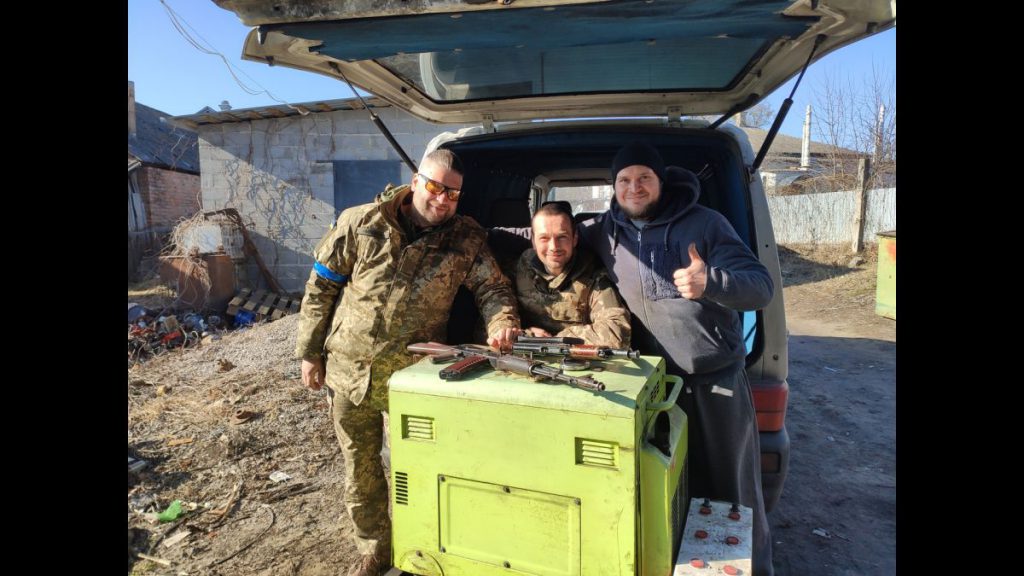
Ukrainian aerospace student leaves lab to keep military tech in top shape (Image Credit: Space.com)
Keeping technical systems in top shape helps Ukraine’s defense forces stay ahead of Russian aggressors. But with a lack of in-house experts, the military has to rely on capable volunteers.
One of those volunteers is Ihor (we only share his first name to protect his anonymity), whose life has turned upside down since Russia invaded Ukraine on Feb. 24.. As a Ph.D. student at Ukraine’s top technology university, the Igor Sikorsky Kyiv Polytechnic Institute, he used to spend his days in a lab tinkering with a new type of magnetic reducer, a kind of device that converts mechanical energy — like a gearbox in a car but without mechanical moving parts.
These days, he spends most of his waking hours with soldiers, driving from site to site, volunteering his technical skills to fix the mobile diesel generators and autonomous power stations that keep army telephones and other communication systems going. The days are long. At 7 a.m. he reports to a checkpoint; he’s out until 8 p.m., when the curfew begins.
Related: Russia’s invasion of Ukraine as seen in satellite photos
“Many posts are in the woods so it’s sometimes very difficult and time-consuming to reach them,” Ihor told Space.com in an email. “That complicates the repair process. Mostly, we don’t have lunch, but sometimes, people bring us food, for which the military are very grateful.”
He talks about “constant fatigue” and not being able to get a proper rest because of air-raid alarms most nights.
“Sometimes you can sit in the shelter at midnight under fire,” he said, adding that life is “very dynamic” these days. “Every day, many buildings are destroyed by shelling, killing hundreds of civilians. Several times I saw an air battle with my own eyes.”
When Russian tanks rolled into Ukraine and missiles started raining down on Kyiv, Ihor left his flat near the Zhulyany Airport, one of Kyiv’s two major international airports, with just a bag of belongings. He spent a few nights in a shelter in the city, then moved in with an acquaintance’s parents in a small town near the city.




“My flat is just 7 kilometers [4.3 miles] from the airport, which was heavily shelled,” he said. “The new terminal was destroyed, and so was a museum and a high-rise housing block, where the head of my department lived. Everyone had to move to nearby schools.”
Ihor’s own family comes from Irshansk, a titanium-mining town about a two-hour drive from Kyiv. But his car was in for repairs when the war started and with most public transport disrupted, he decided to stay in the capital.
The invasion didn’t come as a surprise for Ihor. For the Ukrainians, the war started in 2014, the year Russia annexed Crimea, a peninsula in the Black Sea. Ever since, Ukraine’s larger neigbor had been stirring conflict in the eastern Ukrainian regions of Luhansk and Doneck, calling for their separation from Ukraine and accusing Ukraine of discriminatory behavior against Russian minorities. The fighting there had killed over 14,000 people before the beginning of the full-scale invasion in February, according to International Crisis Group.
“When martial law came into force last month, I was not drafted in the army since I have no military experience,” Ihor wrote. “But some of my acquaintances were taken to the army and said that they had big problems with various types of equipment and that there were no people that could fix it. So they recommended me and some of my colleagues to do such repairs.”
Ihor’s tech skills come less from his studies, which he describes as “mostly theoretical,” and more from seven years working part-time with a company building and fixing autonomous power stations for border guards, banks and hospitals. The word spread quickly among the Ukraine’s defense forces, and soon Ihor found himself in high demand.
“Very often when we do not have the opportunity to get to some places, the military themselves or through volunteers bring us equipment, which greatly simplifies our work,” he said.
Despite the endless grind of air raids, early mornings, long hours on the road, and the destruction and suffering he witnesses day in and day out, Ihor remains upbeat.
“All Ukrainians are in high spirits of victory, our spirit can no longer be broken,” he said. “Every civilian does his best to help his army and his country.”
— ‘Stalin-esque’ attitudes hold back engineering powerhouse Ukraine, says American aerospace student in Kyiv
— Russia’s devastation of Mariupol, Ukraine visible from space in satellite photos
— Ukraine’s proud space industry faces obliteration, but country’s former space chief has hope for the future
But while he has no doubts about the future of his country, he is less certain about the direction his own future will take. Although he is one year away from finishing his Ph.D., he admits that when the war ends, his studies might not be a priority.
“The longer the war lasts, the better the chance that I will not finish my studies,” he said. “Ukraine will again have to get up from its knees and rebuild its infrastructure. Therefore, various specialists in technical fields will again be needed. I hope that maybe this will be a chance to finally build a modern country with modern technology, it is a pity that it is coming at this price.”
Follow Tereza Pultarova on Twitter @TerezaPultarova. Follow us on Twitter @Spacedotcom and on Facebook.








